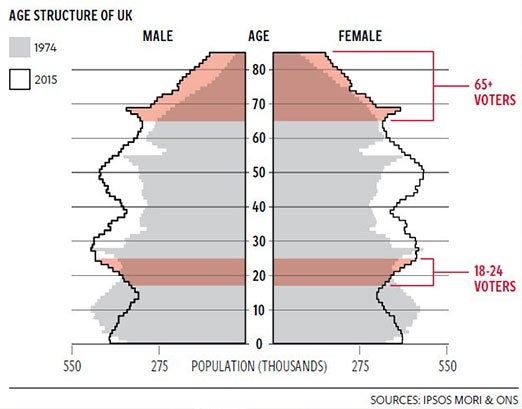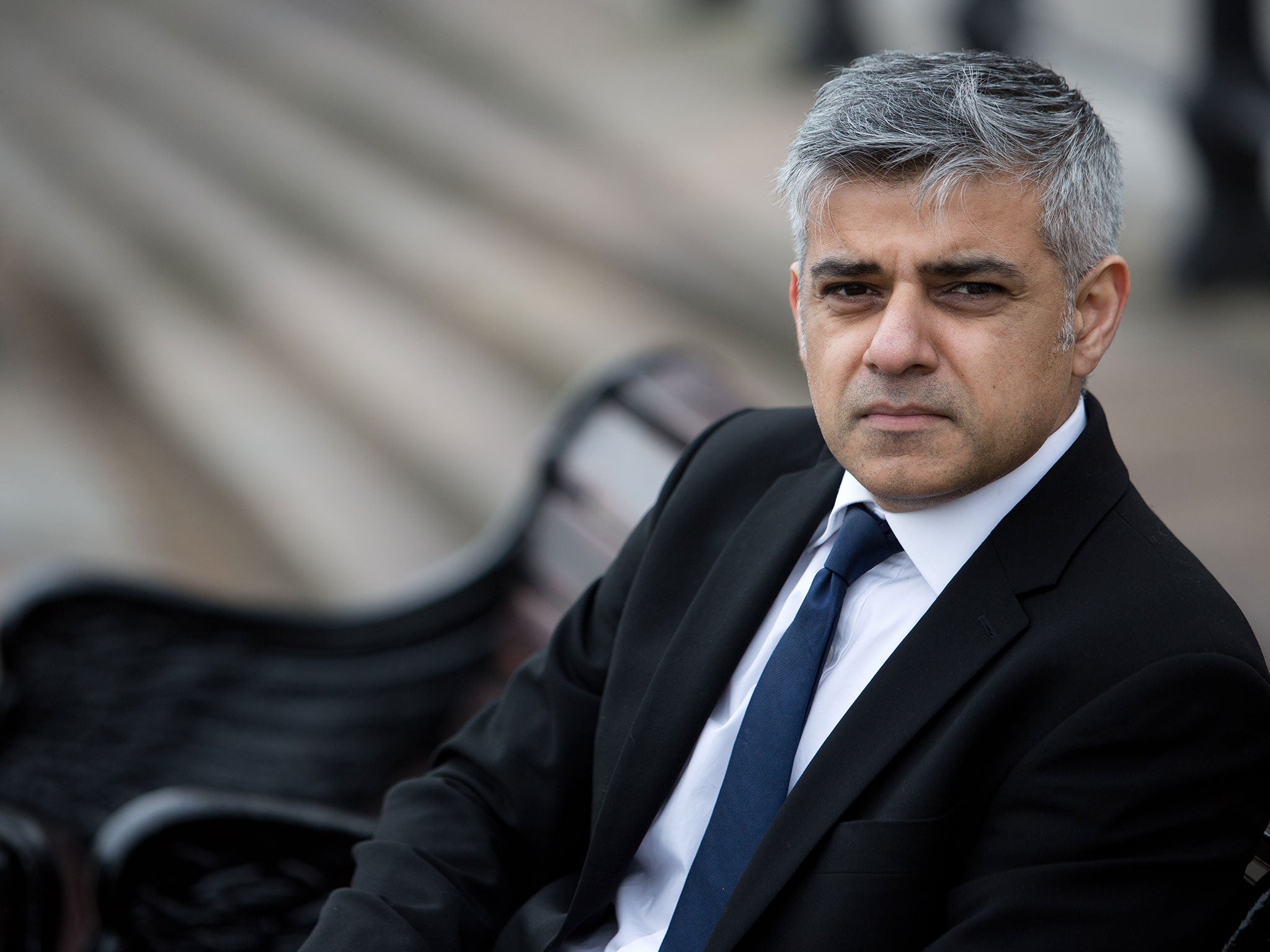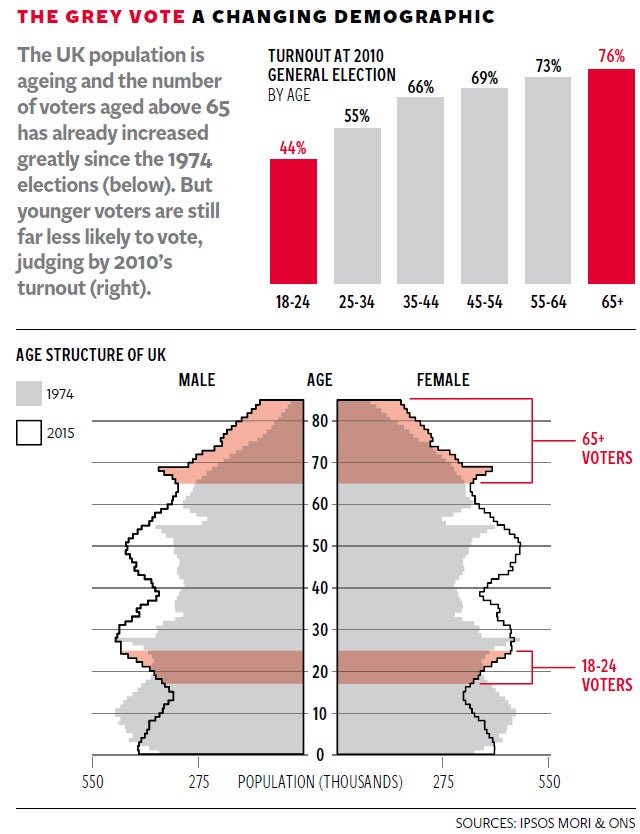Young people are neglected by politicians – and this is why
Shadow Justice Secretary admits all parties concentrate on courting older voters

Political parties are being incentivised to govern Britain only in the interests of the elderly – because they are the one generation who reliably vote, a leading Labour politician warns today.
As all three main parties kick off what is likely to be the longest “proxy” election campaign in years, Sadiq Khan told The Independent he is concerned that politicians are now in a vicious circle where they court “silver voters” and neglect the young simply because they were less likely to vote.
The shadow Justice Secretary – who may be in charge of reforming electoral law if Labour wins the next election – said this exacerbated levels of disengagement among people in their 20s and 30s and contributed to a sense of alienation from party politics.
Mr Khan’s comments come as Labour and the Tories prepare to exchange blows over their competing visions for how they would run the country if they are elected in May.
Ed Miliband will use a speech today to claim the election is a choice between a Tory plan where only a few at the top can succeed and public services are threatened, or his Labour vision to put working people first.

At the same time, the Conservatives will use a press conference in London to cast doubt on Labour’s spending commitments, claiming they cannot be fulfilled without either tax rises or more borrowing.
But Mr Khan said the whole election campaign risked being skewed towards the interests of the elderly unless more young people could be encouraged to vote.
He called for far-reaching reform of Britain’s antiquated electoral rules to help deal with low turnout, and re-stated Labour’s commitment to lowering the voting age to 16 – when schools could be used to encourage participation.

“If you speak candidly to a campaign manager of any of the mainstream parties they will say that they concentrate their energies disproportionately on those they know are going to vote,” he said.
“If you’ve got a candidate with an hour spare and a choice to go to an old people’s home or a sixth-form college, 99 per cent of campaign managers will say you’ve got to go to an old people’s home. That’s because 94 per cent of them are on the register and 77 per cent of them will vote. That is not true of the younger generation.”
Mr Khan said it was also clear from looking at the evidence that government fiscal policies over the past five years had disproportionately benefited the same older people who voted.
This has included the so-called “triple lock” on pensions, which ensures that retirement income goes up by inflation or earns 2.5 per cent each year – whichever is the greatest. The universal winter fuel allowance and free bus passes have also been protected for all pensioners regardless of income.
“You look at any empirical analysis of this Government’s policies and you can see they are going for the silver vote,” he said. “You have to ask if that is good for our country.
“I have come to the stage now where I think the Establishment – whether you call it conservatism – is making a concerted effort to make it as difficult as possible for there to be a level playing field for everyone to take part.”
Mr Khan said the way to address this problem was to encourage young people in Britain to vote from an early age. But he added that politics as a profession was not reaching out to young voters – precisely because they were less likely to vote.
“These guys get neglected all the time despite the fact that some of them receive brilliant citizenship education and have really interesting views and all the evidence is that if you can get someone to vote the first time they can they’ll carry on voting.
“We as politicians have to understand the responsibility on us to engage young people in politics. If someone is not voting that’s a problem.”
Mr Khan said as well as reducing the age of voting to 16, polling stations should be set up in secondary schools, on-the-day voting registration should be established, and the possibility of a longer voting period and online polling should also be examined.
“Why do elections take place on a Thursday? Why do you have to go to a cold church hall to cast your vote? Why can’t you vote by the web? Why can’t you have same-day registration?
“You can get a mortgage in a day – why can’t you do the same with voting registration? If the concern is fraud, we can address that. Is it in our interests to have as many people as possible active citizens, or do we enjoy the fact that a lot of people are passive consumers and the active citizens are older voters?”
Mr Khan, who led Labour’s successful campaign in last year’s local elections in London, said it was also incumbent on politicians to get out more and be prepared to be confronted by the voters.
He said it was too easy in government to become risk-averse and live in an ivory tower where people told you what you wanted to hear.
“When you become a minister, your car picks you up at 7am, you go and do a visit or make a speech or whatever. You then meet civil servants and people who want to lobby you. There is huge deference. So it’s hardly surprising that you become out of touch and aloof. How then do you keep in touch with what ordinary people are thinking?”
Join our commenting forum
Join thought-provoking conversations, follow other Independent readers and see their replies
Comments
Bookmark popover
Removed from bookmarks